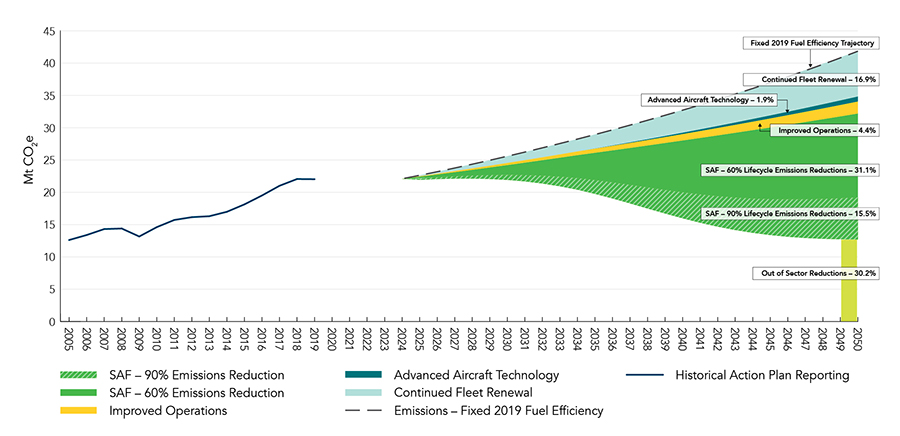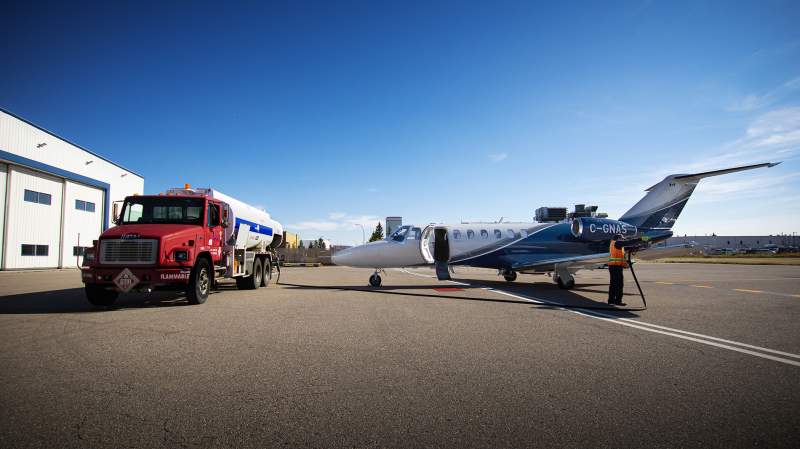ALL AIRSPRINT FLIGHTS ARE 100% CARBON OFFSET
Our steadfast dedication to sustainability furthers our understanding and acknowledgment of aviation's environmental responsibilities—we have chosen to be leaders in the industry at the forefront of climate change discussions and initiatives.
Given the value of the aviation sector in Canada, it is crucial to advance strategies that mitigate the climate impacts of flight operations as Canada and the rest of the world move toward a net-zero greenhouse gas (GHG) emissions future.
At AirSprint, we recognize that our operations impact the global climate through the combustion of jet fuels needed to operate our fleet of aircraft. Globally, the aviation industry contributes approximately 2.4% of global GHG emissions. While the private aviation sector represents a relatively small portion of the worldwide aviation emissions footprint, we are committed to implementing meaningful GHG measurements and mitigation efforts to help us better manage our climate impacts.
We are ready to do what it takes for our community, country and planet.

Our Record Of Achievement
At AirSprint, our fleet of private jets is the newest in North America. We operate our aircraft for specific missions and fly efficient, direct routes between airports. Our modern navigation equipment, combined with engine design and operational best practices, provides for ever-improving fuel efficiency and reduced greenhouse gas (GHG) emissions. Notably, we were the first private aviation company in Canada to operate with Sustainable Aviation Fuel (SAF).
WHY THE TIME IS NOW?
Canada Net-Zero By 2050
Canada’s Aviation Climate Action Plan 2022-2030 sets out a vision for net-zero greenhouse gas (GHG) emissions – both domestic and international – by 2050 for Canada’s aviation sector and identifies the key measures to get there. The Action Plan is the result of the collaborative efforts between the Government of Canada and the aviation industry, and meets Canada’s international commitments to submit an updated action plan to the International Civil Aviation Organization (ICAO).
Sustainable Development Goals (SDGs)
In September 2015, Canada and 192 other United Nations member states adopted the 2030 Agenda for Sustainable Development. The 2030 Agenda is a 15-year global framework centred on an ambitious set of 17 Sustainable Development Goals (SDGs), 169 targets and over 230 indicators. The 2030 Agenda is a global framework of action for people, the planet, prosperity, peace, and partnership. It integrates social,
economic, and environmental dimensions of sustainable development and peace, governance and justice elements.
Through Canada’s 2023-2030 Canada’s Action Plan to Reduce Greenhouse Gas Emissions, the Government of Canada and the Canadian aviation industry will contribute to the following 6 of the 17 SDGs:
![]()
THE NEED FOR SUSTAINABLE AVIATION FUEL (SAF)
SAF, which uses renewable waste and raw materials such as cooking oils in place of traditional jet fossil fuels, has the potential to reduce emissions by approximately 80%1 when compared with its traditional fuel counterparts.
The price and availability of SAF remains the focal point for the aviation industry as SAF’s role in the aviation industry continues to mature. Historically, the price for SAF has been nearly double that of traditional jet fuel2, and supply impediments have limited the broader uptake of the fuel.
As affordability and supply continue to improve in the coming years, AirSprint will regularly evaluate the suitability of SAF for its aircraft and continue to support the transition to low-carbon fuels in the aviation sector. You can learn more about SAF through this video produced by the International Air Transport Association (IATA).
1. Neste, "The Future of Aviation: SAF reduces GHG emissions by up to 80%," 2022
2. Flying Magazine, "Could SAF Be a Cost-Effective Solution to Rising Aviation Fuel Prices?" May 5, 2022

Our Pledge
AirSprint is committed to building a more sustainable future and we pledge to drive real change in the aviation industry. Tackling climate change can't wait, and neither can we. We are acting now to mitigate our environmental impact and enhance our sustainability. There is no time to waste. Please join us.
WHO DO WE WORK WITH?
-
Carbonzero
Carbonzero is a leader in the design and implementation of corporate carbon reduction strategies and solutions in the emerging low carbon economy. Carbonzero helps transform organizations by aiding them in assessing, reporting, and reducing their emissions. Learn More
-
Transport Canada (TC)
A federal institution, leading the Transport Canada portfolio and working with their partners. Transport Canada is responsible for transportation policies and programs. They promote safe, secure, efficient and environmentally responsible transportation. Learn More
-
Environment & Climate Change Canada (ECCC)
Environment and Climate Change Canada informs Canadians about protecting and conserving our natural heritage, and ensuring a clean, safe and sustainable environment for present and future generations. Learn More
-
International Civil Aviation Organization (ICAO)
The International Civil Aviation Organization (ICAO) is a UN specialized agency, established by States in 1944 to manage the administration and governance of the Convention on International Civil Aviation. Learn More
-
International Air Transport Association (IATA)
For over 70 years, IATA has developed global commercial standards upon which the air transport industry is built. Its aim is to assist airlines by simplifying processes and increasing passenger convenience while reducing costs and improving efficiency. Learn More
-
International Business Aviation Council (IBAC)
The IBAC promotes the growth of business aviation, benefiting all sectors of the industry and all regions of the world. Learn More
CARBON OFFSETTING PROGRAM
AirSprint is currently purchasing high-quality carbon offsets on behalf of its Fractional Owners on a voluntary basis, with the Carbon Offsetting Program being incorporated as part of the standard program for all new Fractional Owners as of the start of 2023. The program will increase in magnitude to include all aircraft emissions in 2025.
Carbon offsets are most suitable for emissions that cannot be reasonably avoided or reduced at the source. With zero-emissions equipment and electrification still in the early stages in the aviation sector, carbon offsetting is a significant first step for aviation operators to mitigate the climate impact of their flight operations through the investment in emissions reduction and sequestration projects.
The quality of a carbon offset refers to the level of confidence one has in its use and effectiveness in reducing the effects of climate change. There are several quality criteria that a carbon offset must adhere to when claiming greenhouse gas (GHG) reductions, avoidances and removals.
Our carbon offsetting initiatives focus on two specific efforts, which address 100% of the company’s aircraft emissions.
- Sourcing carbon offsets that meet requirements of aviation industry initiatives, specifically CORSIA.
- Sourcing carbon offsets from projects in Canada to ensure a healthy and robust carbon market in the country that we operate.
Our focus is to ensure that all of our carbon offsets are:
Real – A specific project undertaking must create reductions or removals.
Quantifiable – Must account for the tonnes of CO2 equivalent either reduced, removed or avoided by the project.
Verifiable – Accredited third parties must audit the carbon offset.
Registered – Projects must be registered, serialized, and retired on reputable third-party registries.
Conservative – Projects must use a conservative approach to estimation, measurement and monitoring.
Permanent – The beneficial action of an offset to the atmosphere must be durable and lasting.
Additional – Projects must go beyond 'business-as-usual' to generate carbon offsets, signifying the role that carbon offsets play in ensuring the project activities occur.
CORSIA & Eligible Carbon Offsets
The Carbon Offsetting and Reduction Scheme for International Aviation, or CORSIA, is a global emissions reduction program developed by the International Civil Aviation Organization (ICAO) to offset greenhouse gas (GHG) emissions from international aviation.
The CORSIA program aims to keep aviation emissions consistent with 2019 levels or below, especially as the industry continues to grow. Through its initial phases, from 2021 through 2026, CORSIA requires aviation participants to monitor and report their emissions and voluntarily purchase carbon offsets to mitigate the CO2 associated with international flights.
While AirSprint and its Fractional Owners' aircraft are not subject to the CORSIA requirements at this time, our support and purchase of CORSIA-eligible carbon offsets demonstrate above-and-beyond support for sustainable aviation, in line with industry expectations of larger aircraft operators prior to CORSIA becoming mandatory later this decade.
As an industry leader, AirSprint is helping its Fractional Owners address their climate impacts, ensuring that the emissions from their flights are compensated for by purchasing high-quality carbon offsets.
Canadian Carbon Offsets
Additionally, we are investing in Canadian-based carbon offset projects to compensate for our greenhouse gas (GHG) emissions, alongside our use of CORSIA-eligible carbon offsets. Our support of Canadian-based carbon offsetting projects contributes to our local community's economic and environmental well-being while protecting the natural environment and helping create more jobs.
Our investment into Canadian-based projects helps ensure that we support climate change efforts at home while supporting international aviation sustainability initiatives that are important for our industry.
WE ARE CURRENTLY CONTRIBUTING TO THE FOLLOWING PROJECTS:

Great Bear Forest Project | Canadian-Based
Situated in British Columbia, the Great Bear Forest Carbon Project helps to store CO2 by protecting the world’s largest remaining coastal temperate rainforest, while supporting local indigenous communities.
Learn More
A-Gas V6 Project | US-Based
The A-Gas V6 Project collects industrial Hydrofluorocarbons (HFCs), Chlorofluorocarbons (CFCs), and Hydrochlorofluorocarbons (HCFCs) from old equipment for reclamation then supplies the gases back to the market with no venting into the atmosphere.
Learn MoreGlossary of Terms
-
Carbon Offsetting
Any activity where an individual or company compensates for the greenhouse gas emissions they have released by purchasing third-party verified carbon offsets through emissions reduction projects. Carbon offsets are most suitable for emissions that cannot be reasonably avoided or reduced at the source.
-
Climate Action
Activities to tackle climate change and its impacts, usually by reducing greenhouse gas emissions.
-
Climate Change
Climate change refers to long-term shifts in the global average temperature—and impacts on Earth's climate system. Since the 1800s, human activities have been the main driver of climate change, primarily due to burning fossil fuels like coal, oil and gas. Burning fossil fuels generates greenhouse gas emissions that trap the sun's heat and raise temperatures—also known as global warming.
-
CORSIA
CORSIA stands for Carbon Offsetting and Reduction Scheme for International Aviation. CORSIA is the first global market-based measure for any sector and represents a cooperative approach that moves away from a “patchwork” of national or regional regulatory initiatives. It offers a harmonized way to reduce emissions from international aviation, minimizing market distortion, while respecting the special circumstances and respective capabilities of ICAO Member States
-
Greenhouse Gas (GHG) Emissions
Greenhouse gas (GHG) emissions are produced when hydrocarbons, such as natural gas and oil, are burned. GHGs include carbon dioxide (CO2), methane, nitrous oxide, ozone and water vapour which trap heat in the atmosphere. Also referred to as carbon emissions.
-
Paris Agreement
More than 190 countries adopted a legally binding international treaty on climate change in 2015. Its goal is to limit global warming to well below 2, preferably to 1.5 degrees Celsius, compared to pre-industrial levels. The Agreement provides a durable framework guiding the global effort for decades. It marks the beginning of a shift towards a net-zero emissions world. Implementation of the Agreement is also essential for achieving the Sustainable Development Goals.
-
Sustainability
Sustainability is fulfilling our current generation's needs without compromising future generations' needs while ensuring a balance between environmental responsibility, social well-being and economic growth.
-
Sustainable Aviation Fuel (SAF)
Sustainable Aviation Fuel (SAF) is produced from sustainable feedstocks. It is very similar in chemistry to traditional fossil jet fuel—yet using SAF gives an impressive reduction of up to 80% in greenhouse gas (GHG) emissions over the lifecycle of the fuel compared to traditional jet fuel it replaces. Some typical feedstocks used are cooking oil and other non-palm waste oils from animals or plants; solid waste from homes and businesses, such as packaging, paper, textiles, and food scraps that would otherwise go to landfill or incineration. Other potential sources include forestry waste, such as waste wood, and energy crops, including fast-growing plants and algae.
-
Sustainable Development Goals (SDGs)
A collection of 17 interlinked global goals designed to end poverty, protect the planet and ensure that all people enjoy peace and prosperity by 2030. They were adopted by the United Nations (UN) in 2015.
We stay connected with our communities on the ground.


